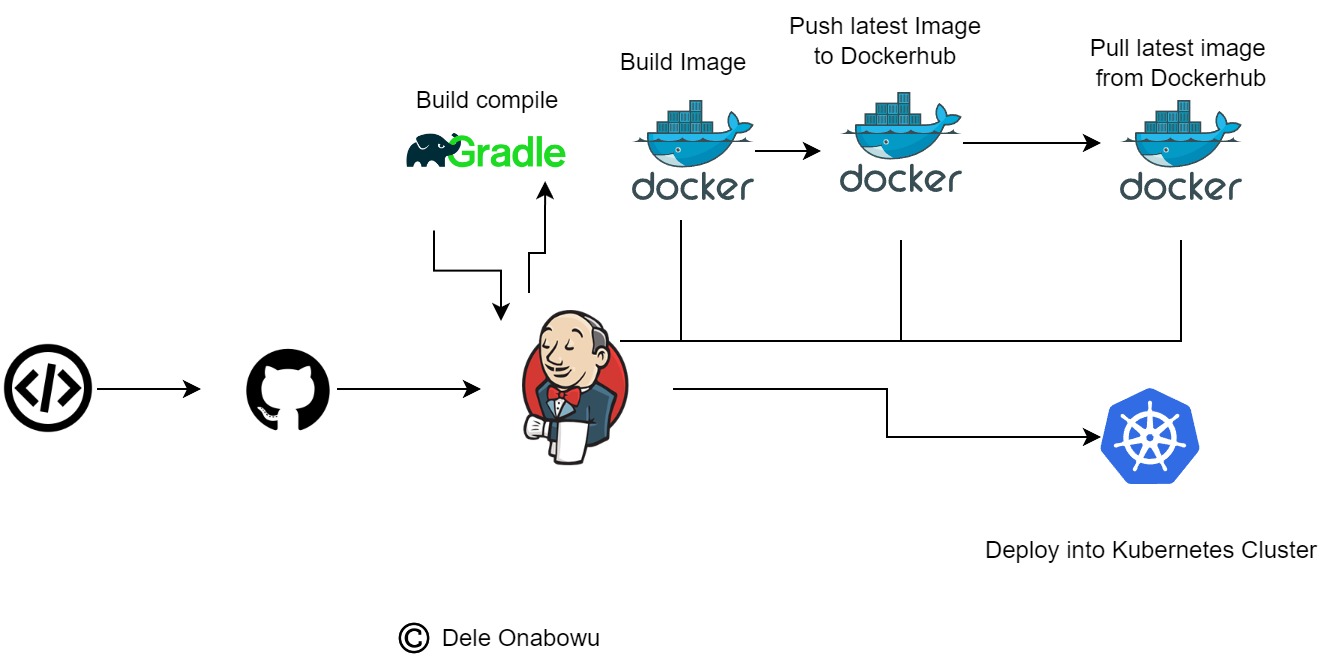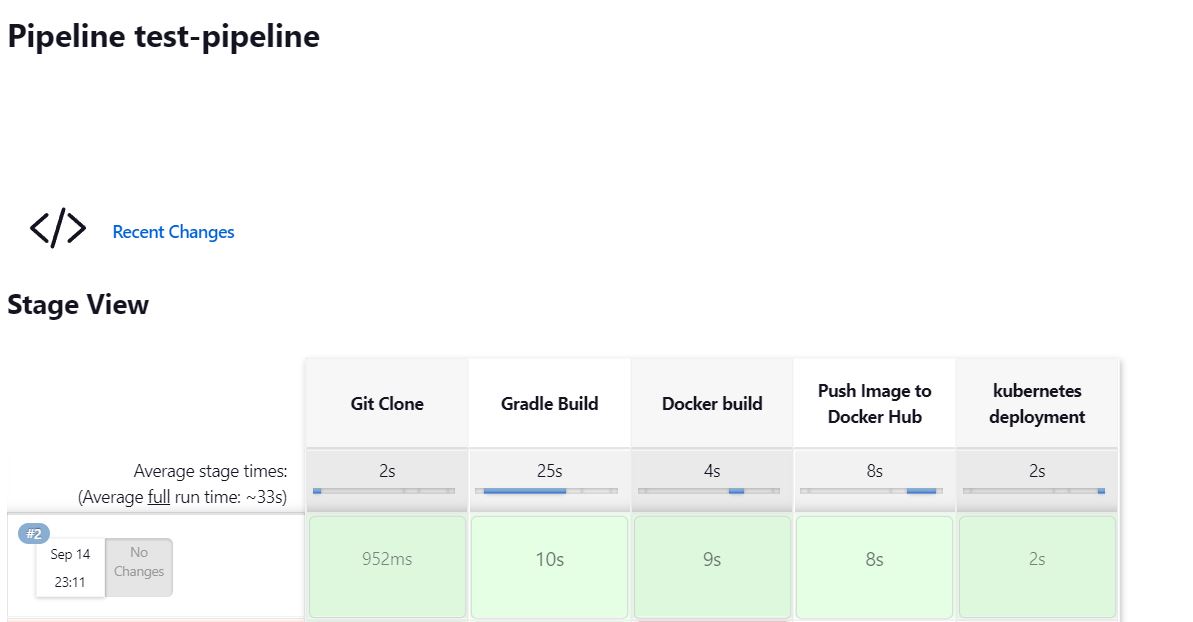SPIN EC2 INSTANCE FOR OUR JENKINS SERVER
- Launch EC2 Ubuntu T2 Medium
- Save pem key for SSH Tasks
- Open port 8080 for jenkins in security group and 22 if not already open
- CHMOD the pem key to 660
chmod +660 mynewkeypair.pem
- Go to my instance > SSH client and copy connection string
ssh -i "mynewkeypair.pem" ubuntu@ec2-3-8-206-166.eu-west-2.compute.amazonaws.com
sudo apt-get update
java -version
sudo apt install openjdk-11-jre-headless
- Add Jenkins repository to package managaer
wget -q -O - https://pkg.jenkins.io/debian-stable/jenkins.io.key | sudo apt-key add -
sudo sh -c 'echo deb https://pkg.jenkins.io/debian-stable binary/ > /etc/apt/sources.list.d/jenkins.list'
sudo apt-get update
sudo apt install jenkins
sudo systemctl status jenkins
http://35.178.44.25:8080/
sudo cat /var/lib/jenkins/secrets/initialAdminPassword
copy and enter password on http://35.178.44.25:8080/
- select Install suggested plugins option
WE NEED TO GIVE ADMIN PRIVILEGES TO JENKINS TO BE ABLE TO RUN OUR PIPELINE (DOCKER,GRADLE, KUBERNETES )
To interact with the Kubernetes cluster, Jenkins will be executing the shell script with the Jenkins user, so the Jenkins user should have thenecessary privileges.
I will add Jenkins as an administrator and assign NOPASSWD so that the root password wouldn't be requested when the pipeline is running.
Open the file /etc/sudoers
sudo vi /etc/sudoers
Assign admin priviledge and no password required
jenkins ALL=(ALL) NOPASSWD: ALL
sudo su - jenkins
Now we need to install docker using the Jenkins user as it has root user privileges.
sudo apt install docker.io
Verify the installation
docker --version
As Jenkins will be accessing docker to build images , we need to add it to the docker grouo as it will be running some docker commands
jenkins@ip-172-31-10-104:~$ docker --version
Docker version 20.10.12, build 20.10.12-0ubuntu4
jenkins@ip-172-31-10-104:~$ sudo usermod -aG docker jenkins
jenkins@ip-172-31-10-104:~$ aws --version
aws-cli/1.22.34 Python/3.10.4 Linux/5.15.0-1011-aws botocore/1.23.34
jenkins@ip-172-31-40-62:~$ docker image ls
Got permission denied while trying to connect to the Docker daemon socket at unix:///var/run/docker.sock: Get "http://%2Fvar%2Frun%2Fdocker.sock/v1.24/images/json": dial unix
/var/run/docker.sock: connect: permission denied
jenkins@ip-172-31-40-62:~$
sudo su - jenkins
jenkins@ip-172-31-40-62:~$ docker image ls
REPOSITORY TAG IMAGE ID CREATED SIZE
jenkins@ip-172-31-40-62:~$
sudo apt install awscli
jenkins@ip-172-31-40-62:~$ aws --version
aws-cli/1.22.34 Python/3.10.4 Linux/5.15.0-1011-aws botocore/1.23.34
jenkins@ip-172-31-40-62:~$
NEXT, I WILL INSTALL KUBECTL - kubectl, allows you to run commands against Kubernetes clusters using the kubernetes API.
curl -LO "https://storage.googleapis.com/kubernetes-release/release/$(curl -s https://storage.googleapis.com/kubernetes-release/release/stable.txt)/bin/linux/amd64/kubectl"
chmod +x ./kubectl
sudo mv ./kubectl /usr/local/bin
jenkins@ip-172-31-10-104:~$ kubectl version
WARNING: This version information is deprecated and will be replaced with the output from kubectl version --short. Use --output=yaml|json to get the full version.
Client Version: version.Info{Major:"1", Minor:"25", GitVersion:"v1.25.0", GitCommit:"a866cbe2e5bbaa01cfd5e969aa3e033f3282a8a2", GitTreeState:"clean", BuildDate:"2022-08-23T17:44:59Z", GoVersion:"go1.19", Compiler:"gc", Platform:"linux/amd64"}
Kustomize Version: v4.5.7
Error from server (Forbidden): <html><head><meta http-equiv='refresh' content='1;url=/login?from=%2Fversion%3Ftimeout%3D32s'/><script>window.location.replace('/login?from=%2Fversion%3Ftimeout%3D32s');</script></head><body style='background-color:white; color:white;'>
Next I will install eksctl - for creating and managing clusters on EKS - Amazon's managed Kubernetes service for EC2
curl --silent --location "https://github.com/weaveworks/eksctl/releases/latest/download/eksctl_$(uname -s)_amd64.tar.gz" | tar xz -C /tmp
sudo mv /tmp/eksctl /usr/local/bin
eksctl version
jenkins@ip-172-31-10-104:~$ eksctl version
0.111.0
jenkins@ip-172-31-10-104:~$
- Name of the cluster : --name dele-test-cluster
- Version of Kubernetes : --version 1.23
- Region : --name eu-west-2
- Nodegroup name/worker nodes : worker-nodes
- Node Type : t2.micro
- Number of nodes: -nodes 2
eksctl create cluster --name bandele-test-cluster --version 1.23 --region eu-west-2 --nodegroup-name worker-nodes --node-type t2.micro --nodes 2
I removed the installed version with
sudo rm /usr/local/bin/kubectl
and installed a new version 1.23
node {
stage("Git Clone"){
git credentialsId: 'GIT_HUB_CREDENTIALS', url: 'https://github.com/rahulwagh/k8s-jenkins-aws'
}
stage('Gradle Build') {
sh './gradlew build'
}
stage("Docker build"){
sh 'docker version'
sh 'docker build -t dele-docker-demo .'
sh 'docker image list'
sh 'docker tag dele-docker-demo deleonabowu/dele-docker-demo:dele-docker-demo'
}
withCredentials([string(credentialsId: 'DOCKER_HUB_PASSWORD', variable: 'PASSWORD')]) {
sh 'docker login -u deleonabowu -p $PASSWORD'
}
stage("Push Image to Docker Hub"){
sh 'docker push deleonabowu/dele-docker-demo:dele-docker-demo'
}
stage("kubernetes deployment"){
sh 'kubectl apply -f k8s-spring-boot-deployment.yml'
}
}




